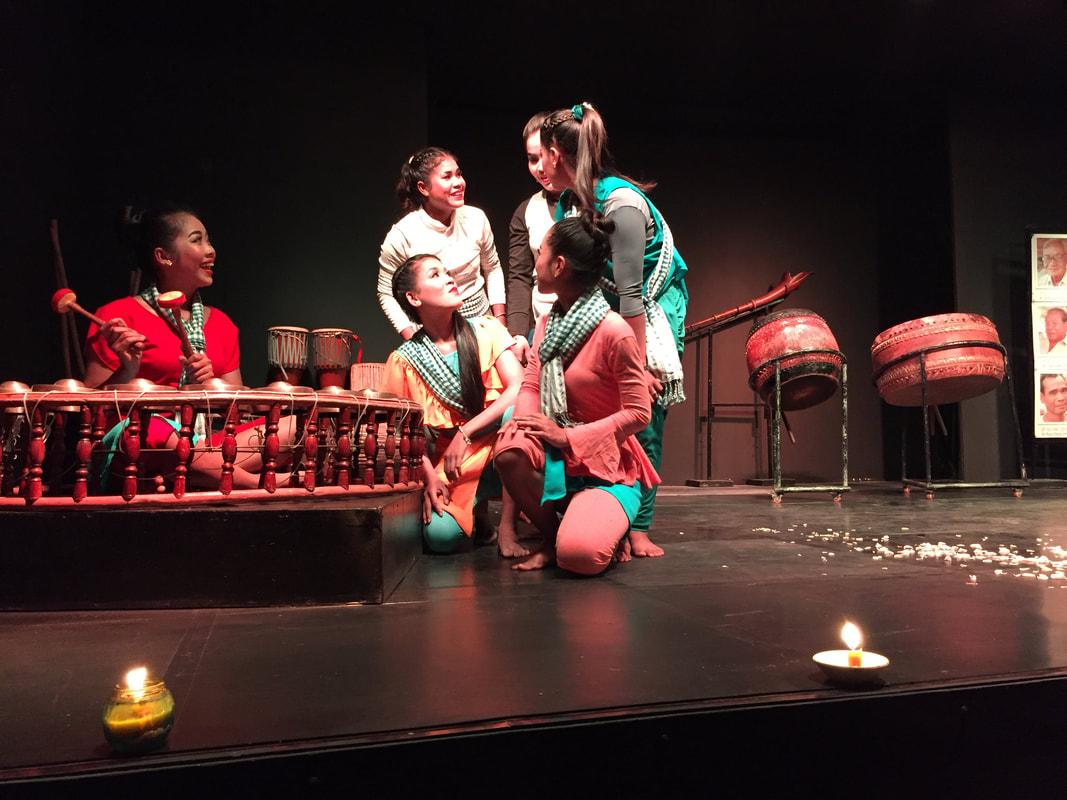Tales of Pacific Pride
|
On our third visit to Siem Reap, this more relaxed major city feels pretty familiar, but at the same time, as in Phnom Penh, the pace of change has clearly been fast. New malls and shops have opened, and there are a lot more pockets of upmarket and at times glamorous shops and eateries. Cambodia’s artistic and cultural capital is clearly on trend - even iced coffees served in jars at cafes with paleo menus have sprung up and are thriving.
Siem Reap is the final destination for the tour later this year, so we’re checking out the hotel and again, meeting with local LGBTQ groups and arts organisations with whom we can partner. We travelled overland from Phnom Penh by car instead of flying. It’s s great way to reacquaint ourselves with the land. The outskirts of Phnom Penh have seen a boom in the housing market. Many acres of land (once rice fields, we assume) have been turned over to identical series of grand, white residential apartments. We wonder who the target market is. Soon after, the familiar rice fields appear, the lush green stems swaying gently in the breeze. It’s Sunday, so no school today. Seems that it may be the only day of rest here for many, although the villages buzz with life and every shop is open. It’s a good day for weddings, and we pass over a dozen; you hear them before you see them, traditional music blaring from tinny speakers. Coloured marquees are set on the edge of the dusty road, chairs with elegant covers arranged within. Women in shining traditional dress arrive on moto, wrapped in casual shirts to preserve their sparkling attire. We stop briefly at the Spider Market. Yes, they sell spiders - great platters of fried ones, big black hairy critters pulled by hand from burrows in the hills. But if spider isn’t your thing, not to worry -there’s deep fried cricket with fresh chilli. The rice fields now are dotted with palm trees; a further sign that we are heading north. The roadside street stalls have changed too: stall after stall of sticky rice. These stalls, more than anything, remind Mel of Siem Reap. The rice is packed into tubes of bamboo (which serves not only as a cooking vessel, but also a compostable takeaway container) and cooked over charcoal. To eat, simply peel the bamboo away. It’s a delicious snack. Just before 2pm we arrive at the Angkor Paradise; our palatial hotel has a light, open foyer, polished granite floor and solid Khmer timber furniture. The staff are immaculately and formally dressed, but welcoming. We feel very underdressed and slightly grubby after our overland trip from Phnom Penh. We’ve been upgraded to a room on the Paradise (5th) floor. There’s plate of fruit and welcoming note from the General Manager. Note to self: dress more appropriately next time... Tonight we’ve been invited to the soft launch of a new show, 'The Call', by drumming group Medha, a new show produced in conjunction with Cambodia Living Arts. This all female drum troupe is seeking to break gender stereotypes in a country where drumming is seen as a male pursuit. Our names are on the door list and Mel is met by Nick Coffill. Hearing my accent, he says, 'You’re not from Sydney, are you? We don’t let people from Sydney in.' It’s clear by his accent and the cheeky glint in his eye that he too is Australian, from Condoblin, in fact. He suggests that Mel pretends to be from Canberra for the night. Nick's been in Siem Reap for six years as Creative Director of the Bambu Stage, a performing arts platform providing a space for artists and puppeteers. He’s interested in our project, suggesting that choirs are needed here. The arts scene in Cambodia was one of the many things destroyed during the Khmer Rouge, and Bambu Stage is one of the many arenas through which artists both Khmer and international are attempting to rebuild it. Bambu Stage is especially interested in Khmer art; of the three stages, one presents a puppet show, with puppets made onsite. There’s no program to go with the night’s performance, but you don’t need to understand Khmer to understand the unfolding story, told though drumming, singing and traditional Cambodian instruments including the korng vong thom and roneat (resembling gamelan instruments). The six women contrast traditional drumming with explorations of modernity: individuality, social isolation and claiming a space for female artists in non-traditional roles. The impression that women playing these particular traditional instruments is transgressive is clear from the moment they take the stage, as is their joy in performing. It’s a refreshing blend of theatre and music, contemporary and traditional, that wouldn’t be out of place at one of the globe’s better fringe festivals. And it’s right here in Siem Reap - after such a successful evening, we hope to see many more shows from Medha.
0 Comments
Leave a Reply. |
Mel & Sarah
Currently blogging from home, in iso like everyone else, and catching up with PPC19 in the form of a daily photojournal. Archives
June 2020
Categories
|
Proudly powered by Weebly

 RSS Feed
RSS Feed